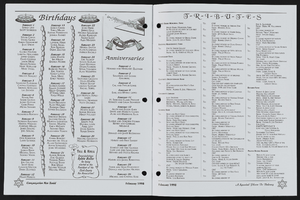Search the Special Collections and Archives Portal
Search Results
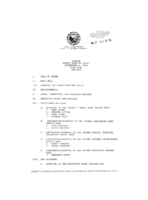
Meeting minutes for Consolidated Student Senate University of Nevada, Las Vegas, September 6, 1990
Date
1990-09-06
Archival Collection
Description
Includes meeting agenda and minutes along with additional information about the memorandum. CSUN Session 20 Meeting Minutes and Agendas.
Text

Interview with Raymond Chester Harbert, February 18, 2005
Date
2005-02-18
Archival Collection
Description
Narrator affiliation: Resident Engineer, Holmes and Narver; Program Manager, Plowshare
Text
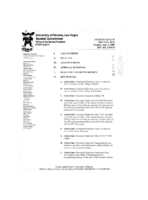
Meeting minutes for Consolidated Student Senate, University of Nevada, Las Vegas, June 26, 2000
Date
2000-06-05
Archival Collection
Description
Includes meeting minutes and agenda, along with additional information about requests, contracts, and amendments.
Text
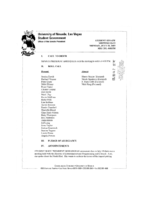
Meeting minutes for Consolidated Student Senate, University of Nevada, Las Vegas, July 28, 2003
Date
2003-07-28
Archival Collection
Description
Includes meeting minutes and agenda, along with additional information about bylaws, memos, and proposals.
Text
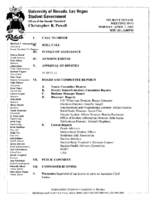
Meeting minutes for Consolidated Student Senate, University of Nevada, Las Vegas, April 07, 2003
Date
2003-04-07
Archival Collection
Description
Includes meeting minutes and agenda, along with additional information about bylaws and letters.
Text
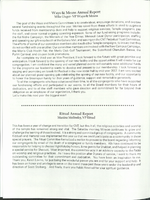
Annual report from Congregation Ner Tamid, 2006
Date
2006
Archival Collection
Description
Annual report from Congregation Ner Tamid, 2006
Text
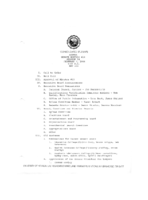
Meeting minutes for Consolidated Student Senate, University of Nevada, Las Vegas, February 7, 1984
Date
1984-02-07
Archival Collection
Description
Includes meeting agenda and minutes along with additional information about amendments to the senate bylaws. CSUN Session 14 Meeting Minutes and Agendas.
Text
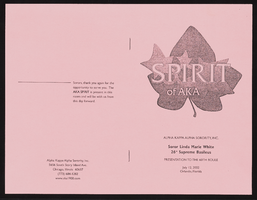
"Spirit of AKA" Alpha Kappa Alpha Sorority targets presentation summary
Date
2002-07-12
Archival Collection
Description
This a brochure of the AKA Spirit program to celebrate the 60th Boule, including a presentation by 26th Supreme Basileus Soror Linda Marie White.
From the Alpha Kappa Alpha Sorority, Incorporated, Theta Theta Omega Chapter Records (MS-01014) -- Chapter records file.
Text

LaPalm Motel Neon Survey document, September 10, 2017
Date
2017-09-10
Archival Collection
Description
Information about the LaPalm Motel sign that sits at 2512 Fremont St.
Site address: 2512 Fremont St
Sign owner: La Palm Motel Inc
Sign details: Property originally constructed in 1963 on 0.33 acres.
Sign condition: 3 - the sign is in decent condition and appears worn from weather. It is unclear if the sign still lights up at night.
Sign form: Roadside pole sign
Sign-specific description: This pole roadside sign has a simple design. A large black pole supports the other elements for this sign. The top portion of the sign features a plastic, backlit sign reading "La Palm" in a black, serif text. Underneath the "lm" of the "La Palm" sign is a series of open channel letters spelling out "MOTEL" against a faded teal background. This portion of the sign is also a thin, rectangular shape allowing for an open space between the "MOTEL" of the sign and the pole that supports it. Underneath the "L" of the "MOTEL" is the bottom portion of the sign that is attached to the pole. This portion of the sign features a plastic, backlit sign reading "DAILY WEEKLY CABLE TV POOL KITCHENETTES LAUNDROMAT" in bold red letters against a white background. Under this is the word "VACANCY" painted in bold white text. Neon tubes spell out "NO" and outline "VACANCY." Along the outer edge of this sign facing Fremont, the sign is painted a pale yellow with incandescent light bulbs lining this section.
Sign - type of display: Neon, indandescent, backlit
Sign - media: Steel and plastic
Sign - non-neon treatments: Paint
Sign environment: This property sits at the corner of East Charleston and Fremont in an area filled with many other smaller motels. There is a Pepe's Taco and Lowe's Home Improvement that close to this motel.
Sign - date of installation: Possibly c. 1963
Sign - thematic influences: There is no exact theme replicated in this sign. It does look similar to other motel signs throughout the city since it sits directly along the roadside allowing motorist and pedestrians to see it easily.
Sign - artistic significance: This sign is a standard example of motel signage because it features the basic elements of a roadside motel sign. It has the name of the property, the word "motel", and other amenities that they may offer.
Survey - research locations: Assessor's website
Survey - research notes: http://www.roadsidepeek.com/roadusa/southwest/nevada/vegas/lvmotel/lvdownmotel/index4.htm
Survey - other remarks: There is not a date of any specific redesign of this sign; however, based on an earlier image of this sign the font in the "La Palm" portion of the sign did change somewhere along the way during the time this property has been around.
Surveyor: Lauren Vaccaro
Survey - date completed: 2017-09-10
Sign keywords: Neon; Incandescent; Backlit; Steel; Plastic; Paint; Pole sign; Roadside
Site address: 2512 Fremont St
Sign owner: La Palm Motel Inc
Sign details: Property originally constructed in 1963 on 0.33 acres.
Sign condition: 3 - the sign is in decent condition and appears worn from weather. It is unclear if the sign still lights up at night.
Sign form: Roadside pole sign
Sign-specific description: This pole roadside sign has a simple design. A large black pole supports the other elements for this sign. The top portion of the sign features a plastic, backlit sign reading "La Palm" in a black, serif text. Underneath the "lm" of the "La Palm" sign is a series of open channel letters spelling out "MOTEL" against a faded teal background. This portion of the sign is also a thin, rectangular shape allowing for an open space between the "MOTEL" of the sign and the pole that supports it. Underneath the "L" of the "MOTEL" is the bottom portion of the sign that is attached to the pole. This portion of the sign features a plastic, backlit sign reading "DAILY WEEKLY CABLE TV POOL KITCHENETTES LAUNDROMAT" in bold red letters against a white background. Under this is the word "VACANCY" painted in bold white text. Neon tubes spell out "NO" and outline "VACANCY." Along the outer edge of this sign facing Fremont, the sign is painted a pale yellow with incandescent light bulbs lining this section.
Sign - type of display: Neon, indandescent, backlit
Sign - media: Steel and plastic
Sign - non-neon treatments: Paint
Sign environment: This property sits at the corner of East Charleston and Fremont in an area filled with many other smaller motels. There is a Pepe's Taco and Lowe's Home Improvement that close to this motel.
Sign - date of installation: Possibly c. 1963
Sign - thematic influences: There is no exact theme replicated in this sign. It does look similar to other motel signs throughout the city since it sits directly along the roadside allowing motorist and pedestrians to see it easily.
Sign - artistic significance: This sign is a standard example of motel signage because it features the basic elements of a roadside motel sign. It has the name of the property, the word "motel", and other amenities that they may offer.
Survey - research locations: Assessor's website
Survey - research notes: http://www.roadsidepeek.com/roadusa/southwest/nevada/vegas/lvmotel/lvdownmotel/index4.htm
Survey - other remarks: There is not a date of any specific redesign of this sign; however, based on an earlier image of this sign the font in the "La Palm" portion of the sign did change somewhere along the way during the time this property has been around.
Surveyor: Lauren Vaccaro
Survey - date completed: 2017-09-10
Sign keywords: Neon; Incandescent; Backlit; Steel; Plastic; Paint; Pole sign; Roadside
Text
Pagination
Refine my results
Content Type
Creator or Contributor
Subject
Archival Collection
Digital Project
Resource Type
Year
Material Type
Place
Language
Records Classification

